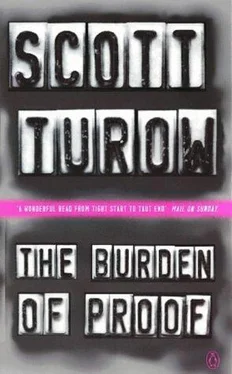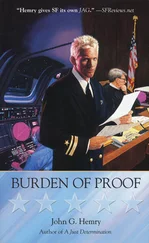Scott Turow - The Burden of Proof
Здесь есть возможность читать онлайн «Scott Turow - The Burden of Proof» весь текст электронной книги совершенно бесплатно (целиком полную версию без сокращений). В некоторых случаях можно слушать аудио, скачать через торрент в формате fb2 и присутствует краткое содержание. Жанр: Детектив, на английском языке. Описание произведения, (предисловие) а так же отзывы посетителей доступны на портале библиотеки ЛибКат.
- Название:The Burden of Proof
- Автор:
- Жанр:
- Год:неизвестен
- ISBN:нет данных
- Рейтинг книги:3 / 5. Голосов: 1
-
Избранное:Добавить в избранное
- Отзывы:
-
Ваша оценка:
- 60
- 1
- 2
- 3
- 4
- 5
The Burden of Proof: краткое содержание, описание и аннотация
Предлагаем к чтению аннотацию, описание, краткое содержание или предисловие (зависит от того, что написал сам автор книги «The Burden of Proof»). Если вы не нашли необходимую информацию о книге — напишите в комментариях, мы постараемся отыскать её.
The Burden of Proof — читать онлайн бесплатно полную книгу (весь текст) целиком
Ниже представлен текст книги, разбитый по страницам. Система сохранения места последней прочитанной страницы, позволяет с удобством читать онлайн бесплатно книгу «The Burden of Proof», без необходимости каждый раз заново искать на чём Вы остановились. Поставьте закладку, и сможете в любой момент перейти на страницу, на которой закончили чтение.
Интервал:
Закладка:
So for the most part he was alone. One night there was an unexpected interruption. A woman from the neighborhood phoned, claiming to be a friend of Clara's. She went on without a pause to describe her husband's repeated failures in the bedroom:-the man had many problems-and ended their conversation saying, simply, "Call me." Stern, of course, did not. Yet the incident provoked a storm of odd feeling, He had heard the same stories as everyone else, of the unattached females who accosted widowers with striking boldness, but given the circumstances of Clara's passing, he was sure that would not happen to him. Oh, perhaps there had been a card'or two, a few calls of sympathy from widows and divorcees of somewhat remote connection. Yet, suddenly, something seemed clarified. People were lonely; women, in particular, were lonely like him. But who knew about all of that-women? Certainly not he. And to what purpose, anyway?
The thought of all this left him feeling worse, baffled and inept, stuck within himself, like something buried.
Whatever the distractions, these evenings in the end always found him roaming. He drank wine, told himself he would work, and wandered about the house. As soon as this routine began, he realized that this, not working, was the primary business of his day. He suffered terribly-at sea with tender recollections and volumes of harsh selfrecrimination-and yet he receded to these moments almost 'urgently, as the years swam over him.
His memory of the past was of a million pages observed by a single incandescent light, and of doors falling open as he arrived, burdened with heavy cases, in a hundred different courtrooms. In the decades he recalled, it was always late at night or the morning of a trial, his emotions an intense admixture of determined concentration and stilled anxiety.
He puzzled in his hours at home; his children spoke and went unanswered as he nursed motions in his mind, a particular careful tack for cross-examination, and reached forth with a tender hand, meant to hush them, while he thought of something else. Oh, he had achieved. He was in his office with his cigars, his books, his phone, his clients, from seven in the morning until nine or ten at night. He came home then to a quiet house. The children were bedded down, gone. Clara waited with a book on her lap in the quiet living room, the aroma of his warming dinner through the house: an image of order, resourcefulness, sufficiency.
Was he persuaded by that pose? For how many years had he comforted himself with the thought that they did not quarrel, that she seldom voiced the Criticisms of other wives? That would have struck Clara as common. True, he treated her with unsparing courtesy. He rarely disregarded her wishes. But, of course, he had chosen wisely, for she seldom spoke up in her own behalf. Oh, they had had their rough spots.
Who didn't? The period when the children had gone off to college was one of intense disruption for Clara. When Kate, the last, departed, there were times when he found her in the dark, in tears. It was there each day, the quiet insinuation, throbbing like a bruise: she did not like her life, no part of it. When he tried to soothe her, she turned on him openly, livid with decades of previously unspoken complaints. But they had stumbled on, and Clara had eventually reverted to her strict self-control, her taut smile, and her insistence that she was bearing up. She was like some Swedish minister enduring existential torment in silence and low light.
On these evenings when he wandered, the wine made him sleepy-he had never been a drinker. He jolted awake to find himself upright in a chair, dry-mouthed, the lights blazing. One night a particularly vivid dream startled him out of his sleep. He was bathing at Wolf's Point in the Kindle River. Unnoticed, the water grew turbulent, and soon he was kicking and struggling while the white froth seethed about him. On the shore, amid the trees, his mother, father, and older brother, dressed in heavy dark woolens, watched, each immobile as a statue. Although he was moving backwards, he somehow Caught sight of Clam and the children through the bare branches. They were in a schoolroom. The children were seated at desks while Clara, with a finger raised, offered instruction. Churning his limbs in the powerful waters, he called, but they did not notice him fighting off the current, being driven farther and farther away.
Fiona Cawley, his next-door neighbor, greeted him, highball glass in hand.
"Sandy!" she cried. From the first. word, Stern knew she was drunk.
Fiona let her front door fly open and stood with her arms thrown wide, backlit by the burning lamps of the living room. Nate, Fiona's husband, also drank more than he should have. Perhaps that was what kept them together. For 'the present, Stern was struck uncannily by a sudden understanding of what motivated Fiona. Loosened by the liquor, she was more attractive; her posture had an alluring pliancy. Clearly, she savored her liberty. She was handsomely dressed as ever in a robin's-egg knit suit that showed off her small figure to advantage. Her hair and makeup were flawless, and she wore jewelry for her evening at home, a large diamond piece between the clavicles. Fiona spent her days caring for herself. She shooed the dog away and pulled Stern into the house by the hand, assuring him, in response to his question, that he was not interrupting dinner. She seemed delighted to see him.
"How are you, Sandy." She touched his face, a drunken, excessive gesture. "We think so much about you." Already he had taken up certain inscrutable mannerisms in response. He had always been good at this, wordless flexing of the brow to suggest complex feelings. Now his look was more pinched, more allusive of pain.
"I am as well as could be expected, Fiona. Is Nate about for just a moment? I was hoping to have a word with him." A personal appearance, Stern had decided, might catch Nate's attention. After hearing from Cal, Stern was determined to be more direct in attempting to unravel Clara's knotted affairs.
"Hasn't he called you? I gave him the message twenty times.
Well, he's out for the evening, Sandy, but stay for a second.-Have a drink with me. There's something I wanted to ask you about. I'm glad you're here."
Without awaiting an answer, she walked halfway down the hall to drive the dog back to the kitchen. Fiona was one of those people who always got what they wanted. She'd given him no chance to make an excuse.
For nineteen years, the Sterns had lived beside the Cawleys. They had watched the Cawleys' modern ranch go through three separate expansions, so that it now wore a somewhat awkward-looking second story, resembling a small top hat on a large-headed man. They had witnessed the coming of age of 'the Cawley children, both of whom were now in college.
They had enjoyed weekend conversations over the fence; an occasional drink or barbecue; two decades of holding mail and exchanging garden tools-but the Cawleys as a couple, like many others, were treated with reserve. Years before, with the retirement of the obstetrician who had delivered the Sterns' children, Clara had begun to visit Nate as her gynecologist and principal physician. In an emergency-a fall from a tree, a minor infection-he was the unofficial medical adviser to the entire family. Somehow, this professional relationship suited the Sterns well, since it offered a diplomatic means of enjoying Nate without Fiona.
As a doctor, he was knowledgeable, relaxed, and affable; at home, he was apt to be overwhelmed by his wife..Younger, Fiona had no doubt been a greatbeauty, and she was still a fine-looking woman, handsomely slender, with arresting light eyes that were almost yellow. But she was, in a phrase, hard to take: nervous, high-pitched, forever striving, striving.
Fiona nursed a hothouse conservatory of internal competitions and visible resentments. A good person to avoid.
Читать дальшеИнтервал:
Закладка:
Похожие книги на «The Burden of Proof»
Представляем Вашему вниманию похожие книги на «The Burden of Proof» списком для выбора. Мы отобрали схожую по названию и смыслу литературу в надежде предоставить читателям больше вариантов отыскать новые, интересные, ещё непрочитанные произведения.
Обсуждение, отзывы о книге «The Burden of Proof» и просто собственные мнения читателей. Оставьте ваши комментарии, напишите, что Вы думаете о произведении, его смысле или главных героях. Укажите что конкретно понравилось, а что нет, и почему Вы так считаете.












